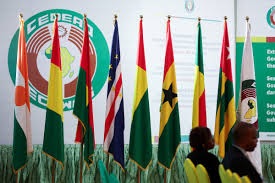By Caroline Ameh
The Council of Ministers of the Economic Community of West African States (ECOWAS) held an Extraordinary Session in Accra on Wednesday to deliberate on the implications of the withdrawal of Burkina Faso, Mali, and Niger from the regional bloc.
The high-level meeting, which comes amid rising concerns over the bloc’s cohesion, focused on contingency planning—including the possible relocation of ECOWAS institutions currently headquartered in the three exiting countries.
Nigeria’s Minister of Foreign Affairs and Chair of the Council, Ambassador Yusuf Maitama Tuggar, presided over the session. In his opening remarks, he extended appreciation to the Government and people of Ghana for their hospitality and praised the symbolic launch of the “ECOWAS at 50” celebrations recently held in Accra.
“This gathering demonstrates our unwavering commitment to the advancement of our regional community and the fulfillment of ECOWAS’s core purpose,” Tuggar stated.
The session follows a directive from the Authority of Heads of State and Government during its 66th Ordinary Session, which mandated the Council to develop modalities and a contingency plan for the disengagement of the Sahelian nations.
According to a statement signed by Alkasim Abdulkadir, Special Assistant on Media and Communications Strategy to the Honourable Minister of Foreign Affairs, key items on the agenda include the suspension of ongoing programs, challenges to the free movement of people and goods, and the administrative relocation of institutions.
The ECOWAS Commission is expected to present memoranda detailing the legal, operational, and diplomatic considerations in managing the unprecedented withdrawal.
Describing the session as a “difficult moment,” Tuggar acknowledged the sovereignty of the withdrawing states while emphasizing ECOWAS’s need to adapt.
“It was never our wish to deliberate on the withdrawal of member states,” he said. “But we must now chart a forward-looking path.”
Despite the political setback, the Council Chair called for renewed dedication to regional integration. He reminded delegates that ECOWAS remains Africa’s most advanced regional bloc, founded on principles of political cooperation, economic integration, and collective security.
“Our unity has been tested before—and we emerged stronger. We will do so again,” Tuggar said.
He concluded by urging his colleagues to engage constructively and to preserve the bloc’s legacy as a cornerstone of West Africa’s collective progress.
“Membership, as the saying goes, has its privileges,” he added.


